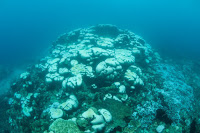A world-first global analysis of marine responses to climbing human CO2 emissions has painted a grim picture of future fisheries and ocean ecosystems.
Published Monday in the journal Proceedings of the National Academy of Sciences (PNAS), marine ecologists from the University of Adelaide say the expected ocean acidification and warming is likely to produce a reduction in diversity and numbers of various key species that underpin marine ecosystems around the world.
...
The researchers found that there would be "limited scope" for acclimation to warmer waters and acidification. Very few species will escape the negative effects of increasing CO2, with an expected large reduction in species diversity and abundance across the globe. One exception will be microorganisms, which are expected to increase in number and diversity.
From a total food web point of view, primary production from the smallest plankton is expected to increase in the warmer waters but this often doesn't translate into secondary production (the zooplankton and smaller fish) which shows decreased productivity under ocean acidification.
"With higher metabolic rates in the warmer water, and therefore a greater demand for food, there is a mismatch with less food available for carnivores ─ the bigger fish that fisheries industries are based around," says Associate Professor Nagelkerken. "There will be a species collapse from the top of the food chain down."
The analysis also showed that with warmer waters or increased acidification or both, there would be deleterious impacts on habitat-forming species for example coral, oysters and mussels. Any slight change in the health of habitats would have a broad impact on a wide range of species these reefs harbour.
Another finding was that acidification would lead to a decline in dimethylsulfide gas (DMS) production by ocean plankton which helps cloud formation and therefore in controlling Earth's heat exchange.
Read more at Global Marine Analysis Suggests Food Chain Collapse

No comments:
Post a Comment